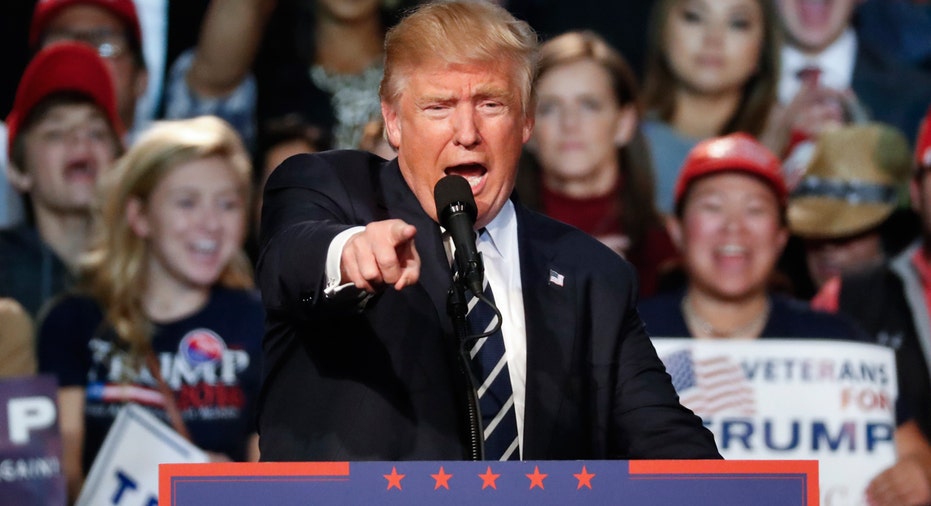Stock Futures Pare Losses as Trump Wins White House

It was an election night Wall Street didn’t expect.
U.S. equity futures plunged on early election reutrns, but pared losses in the wee hours of Wednesday morning after Fox News projected Republican nominee Donald Trump won the White House, bringing the 2016 campaign to a close. Trump led the race in electoral votes through much of the night, taking key battleground states North Carolina, Ohio and Florida. Pennsylvania was the final state that tipped the race into Trump’s hands, bringing his electoral count above the 270 needed to clinch the presidency.
With Trump poised for victory through the night, traders rushed to reassess the outcome of the vote, and its impact on financial markets. They piled into safe havens like gold and government debt. The precious metal rallied as much as 4.68%, while the yield on the benchmark 10-year U.S. Treasury bond, which moves inversely to its price, declined 0.137 percentage point to 1.73%.
Meanwhile, the Mexican peso plunged 11.54% to its lowest-ever level against the U.S. dollar. The currency has been Wall Street’s favorite proxy for betting on the presidential race during the 2016 election cycle. As Trump’s prospects of winning looked better, especially with a tight race in Florida – a state he needed to carry – the the peso dropped.
Dow futures plunged nearly 800 points during the night’s volatile trade, while S&P 500 and Nasdaq 100 futures fell sharply in sympathy. The night’s action threatened to wipe out 2016 gains on both the S&P and Nasdaq at the opening bell on Wednesday. Crude prices followed equity futures lower as West Texas Intermediate prices dropped as much as 3.80% to around $43 per barrel, and Brent followed suit, shedding 3.32% to $44 a barrel.
Stock markets in Asia and Europe also moved solidly lower as traders around the world kept a keen eye on the future of the U.S. political landscape. In short, the election’s outcome had traders around the globe scrambling for cover, said Peter Kenny, senior market strategist at Global Markets Advisory Group.
“His potential presidency brings with it many variable not yet priced into the economic narrative from trade, to trade pacts, to multi-national economic agreements, and mutual defense agreements,” he explained.
The sharp moves forced investors to reverse expectatoins for a Clinton victory that had been priced in early in the week. On Monday, U.S. stocks boomed higher, snapping nine-straight days of losses after FBI Director James Comey said the bureau would not pursue criminal charges against the Democratic presidential nominee related to ongoing controversy around her use of a private email server. During the regular trading session Tuesday as voters headed to the polls to cast their ballots, Wall Street extended those Monday gains, sending stocks moderately higher by the close of trade.
The market’s volatile swings are reminiscent of the frantic action seen back in June following the so-called Brexit referendum in the U.K. when voters there decided to sever their nation’s more than 40-year membership in the European Union. In response, financial markets, which had priced in a “remain” vote, rushed into safe havens as uncertainty reigned about the future of the country’s direction and long-term trade deals.
A similar pattern played out in the U.S. on Election Night.
“It seems remarkable that we are watching this unfold just a few short months after Brexit,” said IG chief market analyst Chris Beauchamp. “Once again, the cat has been set amongst the pigeons. Clinton’s path to the White House, so assured just a few hours ago, now looks to be a dead end.”



















